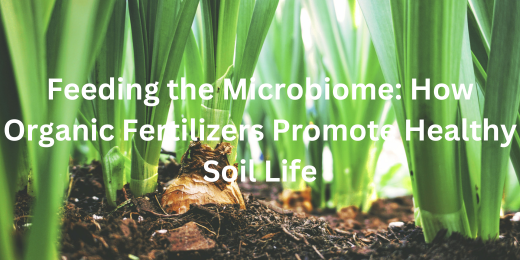
Feeding the Microbiome: How Organic Fertilizers Promote Healthy Soil Life
Soil microbiome
Introduction
Sustaining a long-term production of food along with environmentally friendly farming depend on healthy soil. The soil microbiome consists of beneficial microorganisms that support plant growth by improving nutrient availability. Applying organic fertilisers enhances soil quality, supports soil microbiology, and increases crop productivity.
There are numerous benefits of organic fertilizers, such as increasing soil fertility and promoting healthier root development. By providing nutrients in their natural state, organic fertilisers lower the possibility of dangerous chemical accumulation. This natural approach leads to the production of organic food, which is healthier and free from synthetic additives.
The demand for organic products continues to rise due to growing awareness of environmental sustainability. Consumers are increasingly choosing organic food products for their nutritional value and eco-friendly production methods. Many now shop at a local organic store, which offers a variety of healthy, responsibly sourced goods.
Understanding the Soil Microbiome
A wide variety of microorganisms, such as fungi, bacteria, and various other helpful microbes, make up the soil microbiome. By dissolving organic materials, these microbes release nutrients that are essential to the growth and development of plants. A well-balanced soil microbiome supports plant productivity by improving nutrient availability and strengthening plants’ natural defence mechanisms.
The capacity of organic fertilisers to support and nurture the soil microbiota is what gives them their advantages. The microbial operation that organic fertilisers encourage improves the structure of soil as well as the circulation of nutrients. This results in healthier crops and higher yields, reducing the need for chemical inputs while improving overall plant resilience.
Consuming organic food has become more popular due to its health benefits and lower environmental impact. People prefer organic products because they are free from harmful chemicals and synthetic additives. Many individuals now choose organic food products from their local organic store for better nutrition and sustainability.
The Role of Organic Fertilizers vs Chemical Fertilizers
Organic and synthetic fertilizers differ in composition, with the former derived from natural sources and the latter chemically processed. Organic fertilizers work by slowly releasing nutrients, allowing plants to absorb them naturally over time. The soil microbiome benefits greatly from this gradual release, promoting healthier and more sustainable soil ecosystems.
Beyond just supplying nutrients, organic fertilisers can improve soil structure and promote the retention of water. These fertilisers promote the development of advantageous microorganisms that enrich the soil by decomposing materials that are organic. Organic fertilisers, as opposed to synthetic ones, lessen the chance of soil deterioration and nutrient loss over time.
Consumers increasingly choose organic food because of its perceived health advantages and eco-friendly production methods. Organic farming, supported by the use of natural fertilizers, produces crops with fewer harmful residues. This trend towards sustainable agriculture benefits both human health and the environment through responsible farming practices.
Types and Benefits of Organic Fertilizers
Compost, manure, green manure, and biochar are commonly utilised organic fertilizers in sustainable farming, known for enhancing soil fertility and promoting environmentally friendly agricultural practices. Each type benefits the soil microbiome, enhancing soil biodiversity by encouraging the growth of beneficial microorganisms. These microorganisms improve soil fertility and boost plant nutrition supply by breaking down organic particles.
The benefits of organic fertilizers vary depending on the type and soil conditions. Compost enriches the soil with nutrients, while manure improves water retention, but both may require careful management. Green manure prevents soil erosion, and biochar enhances soil structure, making them ideal for different agricultural needs.
Using organic food production methods relies on selecting the appropriate fertilizer for specific soil types. Manure enhances water retention in sandy soils, while biochar improves nutrient content in clay soils, optimizing soil health and productivity in different soil types. These natural fertilizers support plant growth, helping farmers produce healthier crops with less environmental impact.
Promoting Soil Microbiome Health with Organic Fertilizers
By fostering a more nutritious environment for soil and augmenting the soil microbiome, organic fertilisers aid in the growth of advantageous microorganisms. These microbes decompose organic matter, releasing essential nutrients that boost soil fertility, leading to healthier soil and improved plant growth. This natural process supports plant growth, contributing to sustainable farming practices that enhance long-term agricultural productivity.
Minimising the requirement for dangerous pesticides and chemical fertilisers is one advantage of using organic fertilisers. By nourishing the soil naturally, organic fertilizers lower the dependency on synthetic inputs, which may harm soil health. This approach promotes a balanced ecosystem, protecting plants while maintaining environmental integrity.
Employ organic fertilisers in accordance with the unique requirements of the soil and crops for optimal results. Different organic materials cater to varying soil conditions, ensuring optimal results. This method supports the production of high-quality organic food, providing healthier options for consumers and improving agricultural sustainability.
Conclusion
Organic fertilizers are essential for supporting healthy soil by enriching the soil microbiome, which helps boost microbial activity and overall soil health. They provide essential nutrients to the soil, encouraging the growth of beneficial microorganisms. This leads to improved soil structure, better water retention, and sustainable plant growth, making organic farming an eco-friendly practice.
The benefits of organic fertilizers go beyond nutrient provision, contributing to long-term soil health and reduced environmental impact. Organic farming helps preserve the ecosystem by eliminating the need for harmful chemicals. Consumers are increasingly choosing organic food, which supports healthier living and more sustainable agricultural practices.
For those looking to adopt organic farming, using organic products like Uyir organic products is essential. Visit your nearest Uyir Organic Farmers Market to explore a wide range of sustainable options. To learn more, visit www.uyironline.in or www.uyirorganic.farm for detailed information on organic products and practices.